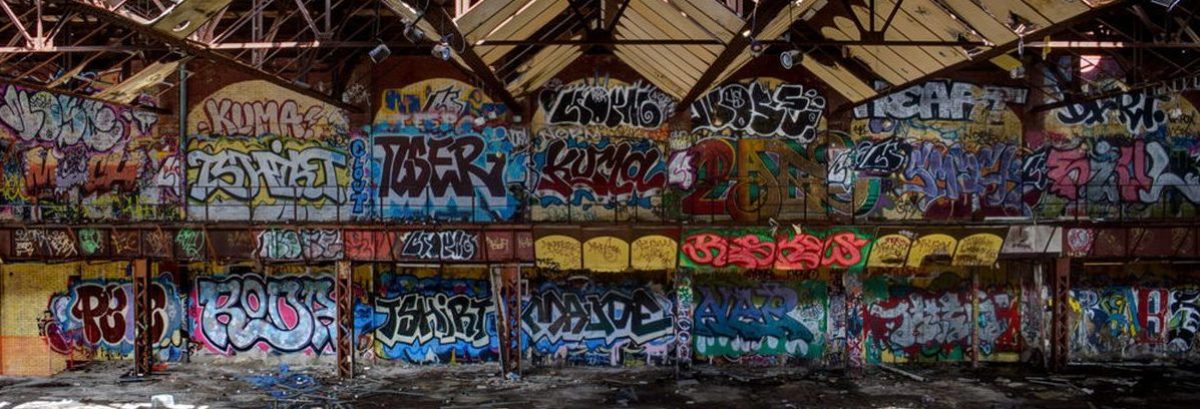Subaltern Governance: Reimagining Citizenship in Urban Spaces
Occupied Resistance in the Shadows of Neoliberalism
Project Summary:
Since the 1970s, people experiencing or at risk of homeless in the US have increasingly responded to housing insecurity via squatting (Loftus-Farren 2011), occupying abandoned buildings, vacant lots, and other liminal spaces without legal authorization (Prujit 2012). Beyond satisfying material needs, squatting assumes numerous political forms, allowing residents to collectively mobilize against unaffordable housing (Pruijt & Roggeband 2014). These communities thus often function as sites of “subaltern political action” (Vasudevan 2015:339), whereby ‘occupiers’ collectively claim a “right to the city” (Uitemark et al. 2012) and reimagine propertied citizenship (Sparks 2017).
Given this context, this project poses the following questions: (1) how do squatting communities resist (albeit illegally) both the lack of affordable housing and ideals of private property?; (2) how might these settlements produce novel notions of citizenship and governmentality?; and (3) how do such movements rearticulate the right to urban space? Drawing upon scholarly and popular articles, I will briefly explore the history of informal housing in the US, thereafter examining various squatting movements, including homesteading in New York City, ‘guerrilla’ occupations in Detroit, and west coast ‘tent cities.’ Lastly, I will assess how the 2011 Occupy movement recently embraced squatting to conceptualize a new post-neoliberal social contract.
Potential References:
Bibliography
Arnold, Eric K. 2012. “Foreclosure Crisis Meets Occupy Effect.” Race, Poverty & the Environment 19(1). Retrieved March 1, 2019 (https://urbanhabitat.org/files/19-1.arnold.pdf).
Durst, Noah J. & Jake Wegmann. 2017. “Informal Housing in the United States.” International Journal of Urban and Regional Research 41(2):282-97. Retrieved February 28, 2019 (https://doi.org/10.1111/1468-2427.12444).
Fairbanks, Robert P. 2011 “The Politics of Urban Informality in Philadelphia’s Recovery House Movement.” Urban Studies 48(12):2143-59. Retrieved February 28, 2019 (https://doi.org/10.1177/0042098011411943).
Herbert, Claire W. 2018. “Squatting for Survival: Precarious Housing in a Declining U.S. City.” Housing Policy Debate 28(5):1-17. Retrieved February 28, 2019 (https://doi.org/10.1080/10511482.2018.1461120).
Herring, Chris. 2014. “The New Logics of Homeless Seclusion: Homeless Encampments in America’s West Coast Cities.” City & Community 13(4):285-309. Retrieved March 1, 2019 (https://doi.org/10.1111/cico.12086).
Jaleel, Rana. 2013. “A Queer Home in the Midst of a Movement? Occupy Homes, Occupy Homemaking.” In Periscope: Is This What Democracy Looks Like?, Eds. Bauer, AJ., Cristina Beltran, Rana Jaleel & Andrew Ross. Retrieved March 1, 2019 (https://doi.org/10.7916/D8FJ2SXZ).
Kinder, Kimberly. 2014. “Guerrilla-style Defensive Architecture in Detroit: A Self-provisioned Security Strategy in a Neoliberal Space of Disinvestment.” International Journal of Urban and Regional Research 38(5):1767-84. Retrieved February 28, 2019 (https://doi.org/10.1111/1468-2427.12158).
Loftus-Farren. 2011. “Tent Cities: An Interim Solution to Homelessness and Affordable Housing Shortages in the United States.” California Law Review 99(4):1037-1081. Retrieved March 1, 2019 (https://doi.org/10.15779/Z38HH6C).
Prujit, Hans. 2012. “The Logic of Urban Squatting.” International Journal of Urban and Regional Research 37(1):19-45. Retrieved February 28, 2019 (https://doi.org/10.1111/j.1468-2427.2012.01116.x).
Prujit, Hans & Conny Roggeband. 2014. “Autonomous and/or institutionalized social movements? Conceptual clarification and illustrative cases.” International Journal of Comparative Sociology 55(2):144-65. Retrieved February 28, 2019 (https://doi.org/10.1177/0020715214537847).
Sparks, Tony. 2017. “Citizens without property: Informality and political agency in a Seattle, Washington homeless encampment.” Environment and Planning A 49(1):86-103. Retrieved February 28, 2019 (https://doi.org/10.1177/0308518X16665360).
Starecheski, Amy. 2014. “Squatting History: The Power of Oral History as a History-Making Practice.” Oral History Review 41(2):187-216. Retrieved February 28, 2019 (https://doi.org/10.1093/ohr/ohu030).
Vasudevan, Alexander. 2015. “The makeshift city: Towards a global geography of squatting.” Progress in Human Geography 39(3):338-59. Retrieved February 28, 2019 (https://doi.org/10.1177/0309132514531471).
Wegmann, Jake. 2015. “Research Notes: The Hidden Cityscapes of Informal Housing in Suburban Los Angeles and the Paradox of Horizontal Density.” Buildings & Landscapes: Journal of the Vernacular Architecture Forum 22(2):89-110. Retrieved March 1, 2019 (https://www.jstor.org/stable/10.5749/buildland.22.2.0089).
Other Sources of Information
Burns, Rebecca. 2012. “No Vacancies: Squatters Move In.” In These Times, April 19. Retrieved March 1, 2019 (http://inthesetimes.com/article/13037/no_vacancies_squatters_move_in).
Gabbet, Adam & Ryan Devereux. 2011. “Wall Street protestors to occupy foreclosed homes.” The Guardian, December 6. Retrieved March 1, 2019. (https://www.theguardian.com/world/2011/dec/06/occupy-wall-street-occupy-foreclosed-homes).
Pratt Center & CHHAYA CDC. 2008. New York’s Housing Underground: A Refuge and Resource. New York: Pratt Center for Community Development. Retrieved March 1, 2019 (https://prattcenter.net/sites/default/files/housing_underground_0.pdf).
Lopez’s comments:
Brandon, I’m really excited about the project you propose. I think a way to potentially frame the subaltern politics associated with squatting is through use of James C. Scott’s theory of infra-politics. According to Scott, infrapolitics are the subaltern forms of resistance taken by subordinate subjects that are largely invisible to those who dominate them. While, for instance, state officials may know that squatters exist and where they live, it may be that they do not forcibly remove them because the state would then have to offer them housing. Also, Scott believes that squatting gives homeless people some type of freedom because it gives them housing, however, when normal requests are made to legalize their status the state then turns to criminalize squatters. This is a romantic view by Scott squatting, but it may give you something to think through as you start this project.
